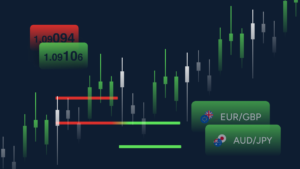In the high-stakes world of trading, emotions often drive traders to make decisions that contradict their strategy. The excitement of a big win or the frustration of a loss can cloud judgment, leading to impulsive decisions. This is where trading discipline plays a critical role.
Discipline in trading means sticking to your predefined plan and resisting emotional impulses, which is vital for achieving consistent results in the market. This article explores why trading discipline is essential and how to develop the self-discipline necessary to stay focused and succeed.

What Is Trading Discipline?
Trading discipline refers to a trader’s ability to consistently follow their trading plan, including entering and exiting trades systematically without being swayed by emotional urges. Traders must adhere to rules and strategies even when faced with market fluctuations or impulses to act hastily. In volatile markets, where emotions often run high, the disciplined trader remains focused on the long-term plan, knowing that emotional decisions tend to lead to unfavorable outcomes.
Why Trading Discipline Is Important to Success?
Stops Emotional Trading Decisions
One of the greatest advantages of discipline is that it prevents traders from making emotional decisions. Fear, greed, excitement, and frustration are common emotions that can distort judgment. A trader may enter a trade too early due to excitement or hold on to a losing position too long out of fear of taking a loss. Discipline helps traders recognize these emotions and control them, leading to more rational and consistent decision-making aligned with long-term goals.
Reduces Risk and Losses
Undisciplined trading often results in over-risking and substantial losses. Without a clear plan or rules, traders might make impulsive decisions that expose them to unnecessary risks. A disciplined trader, however, uses tools like position sizing, stop-loss orders, and careful trade planning to minimize risk and protect capital. This approach ensures that the trader doesn’t take on excessive risks for short-term gains, preserving capital and increasing the likelihood of long-term profitability.
Ensures Consistency in Trading Performance
Success in trading isn’t about a few lucky trades; it’s about consistency over time. Disciplined traders execute their strategies in a consistent manner, sticking to their plans regardless of short-term market fluctuations. Consistency is crucial for building a successful and profitable trading career. On the other hand, undisciplined traders often make erratic decisions, such as entering trades without strategy or “revenge trading” after losses, which hinders their long-term success.
Helps Traders Stick to Plans and Set Realistic Goals
A well-structured trading strategy includes clear rules for risk management, entry and exit points, and achievable profit targets. Trading discipline helps traders adhere to these rules, avoiding impulsive decisions based on current market conditions. Traders who lack discipline often abandon their plans when faced with volatility or unfavorable market moves, setting unrealistic targets or making hasty changes. A disciplined trader, however, sticks to the plan, making adjustments only when necessary, which helps in achieving long-term success.
Steers Away from Overtrading Pitfalls
Overtrading occurs when traders enter too many positions out of greed or a desire to recover from losses. This emotional trading often results in poor performance and higher transaction costs, which erode profits over time. Trading discipline helps traders avoid overtrading by ensuring they only enter positions that meet their predefined criteria, avoiding impulsive actions driven by greed or fear.

How to Cultivate Trading Discipline?
1. Develop a Detailed Trading Plan
The foundation of trading discipline is a solid trading plan. Your plan should include trading goals, risk tolerance, market selection, trading style, analysis methods, and entry/exit criteria. With a clear plan, you can avoid uncertainty and have a structured approach for making decisions. Once your plan is set, stick to it, resisting the temptation to deviate from it due to temporary market conditions or emotional urges.
2. Use Risk Management Tools
Effective risk management is crucial for maintaining discipline. Set risk limits for each trade, typically risking only 1-2% of your capital. Utilize stop-loss orders, trailing stops, and take-profit orders to protect your positions and ensure trades stay within acceptable risk parameters. These tools not only protect your capital but also encourage you to adhere to predetermined risk levels rather than making impulsive decisions.
3. Keep a Trading Journal
A trading journal is invaluable for developing discipline. By recording each trade, including the reasons for entering and exiting, your emotional state, and the outcome, you can analyze patterns in your behavior. This helps identify instances when you acted impulsively or deviated from your plan. Regularly reviewing your journal enables you to improve your discipline by learning from past mistakes and successes.
4. Take Breaks and Avoid Trading in Emotional States
Mental exhaustion can impair judgment, leading to poor decisions. Taking breaks from trading allows you to clear your mind and reset emotionally. Avoid trading immediately after a loss or a string of losses, as emotions like frustration or desperation can cloud your judgment. Similarly, avoid trading when feeling euphoric after a win, as overconfidence can lead to recklessness. A balanced mindset is key to maintaining discipline.
5. Practice Patience
Patience is essential for maintaining trading discipline. Markets don’t move according to a trader’s desires, and waiting for the right opportunities is key to success. A disciplined trader knows that they must wait for high-probability setups rather than rushing into trades based on impulse. Patience enables traders to stick to their strategy, reducing the likelihood of emotional decisions.
6. Improve Continuously and Learn
Discipline is a skill that improves with time and experience. By continuously studying past trades, learning from mistakes, and refining your strategy, you can enhance your discipline. A deeper understanding of both the markets and your personal emotions will help you control impulsive actions and make more disciplined decisions over time.
Frequently Asked Questions – Focus, Execution!
Why is discipline important in trading?
Discipline helps you stick to your trading plan, avoid impulsive decisions, and manage emotions like fear and greed, which can lead to mistakes and losses.
How can I stay disciplined in the markets?
To stay disciplined, set clear goals, stick to your strategy, avoid chasing the market, and regularly review your performance.
How does lack of discipline affect my trading?
Lack of discipline can lead to overtrading, ignoring risk management, and making emotional decisions, which can quickly erode capital.
Can trading psychology improve with discipline?
Yes, a disciplined approach builds a stronger mental framework, reduces emotional trading, and enhances your ability to follow a consistent, rational strategy.
What are some tips for maintaining focus while trading?
Eliminate distractions, take regular breaks, and set specific times for trading. Keep your trading area organized and conducive to focus.
How can I recover from a loss and stay disciplined?
Acknowledge the loss, analyze it, and adjust your strategy. Stick to your trading plan without trying to recover losses impulsively, as this can lead to more mistakes.
Conclusion:
Trading discipline is a vital trait that separates successful traders from those who fail to achieve consistent results. It helps traders make rational decisions, manage risks effectively, and stick to their plans despite market fluctuations. Developing discipline takes time, practice, and commitment to following a structured plan. By using risk management techniques, taking breaks, practicing patience, and constantly learning, you can cultivate the discipline needed to succeed in the unpredictable world of trading.
Remember, trading is not a get-rich-quick endeavor—it requires dedication, time, and mental fortitude. With discipline, you can weather the ups and downs of the market and stay on track to achieve your long-term trading goals.
Table Of Content
Recent Posts
- Top 10 Commodities

- Top 5 Forex Trading Strategies for Consistent Profits in 2025 (All You Need to Know)

- Day Trading vs. Position Trading in Commodities: Which Strategy Works?

- Best Crypto Trading Strategy in 2025: Learn How to Trade Cryptocurrency in 5 Easy Steps!

- The Role of Technical Indicators in Trading: Enhancing Your Analysis


